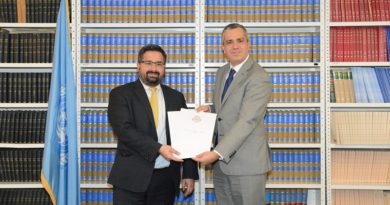Why religious groups need to speak out in defence of creation
A British Methodist minister and academic, Jane Leach, has said that “For anyone covenanted to the long term flourishing of the earth, its creatures, and its peoples, there will be many setbacks along the way; contracts will need to be made that take seriously immediate effects; some contracts will get broken; yet truly covenantal commitments endure”.
Leach was speaking about the Paris Climate Change Agreement, which was described by 19 of the leaders who met for the G20 gathering of nations in Hamburg, Germany, at the week-end as “irreversible” on BBC Radio 4’s Today programme.
The statement about the agreement being irreversible was not endorsed by just one major economy. We’re looking for similar expressions of support for climate action under the Paris Agreement by faith leaders equally worried about preserving life on Earth as we know it. If you are such a leader, post your opinion on social media using the hashtag #Faith4Paris.
She said, “For those of us who rejoiced last April at the signing of the Paris Agreement on Climate Change, the news that President Trump has definitely is withdrawing the US from it is a bitter disappointment, little mitigated by the insistence of the other 19 nations that the agreement is irreversible. If the most powerful nation involved can come out of the agreement, what on earth does irreversible mean?
Accustomed as we are to thinking about life in contractual terms, it’s difficult to see how the US withdrawal will not only fail to reduce carbon emissions across its own territories, but also undermine the very basis of the whole agreement. Unsurprisingly some developing nations are already voicing their fears about whether the compensation levels that secured their participation can be maintained without America’s commitment.
A contract, though, is not the only kind of agreement: ‘I’ll do this, if you do that, and if not all bets are off’. In the biblical tradition there’s another kind of agreement in which the commitment of the parties is not only to the terms, but to what lies behind them. So God makes a series of covenants with the human race. Despite the repeatedly demonstrated capacity of human beings for faithlessness, God remains faithful. Perhaps the most vivid and well known of these covenants is the one made with Noah and sealed with a rainbow: a sign that God will not seek to wipe out the human race and start again with the earth, but will patiently work with us towards its fulfilment.
The Noah story begins with the building of an ark into which two of every species on the earth are herded in order to conserve them. In the news this weekend has been an announcement by the Lynx Trust that they are about to apply to reintroduce six lynx into Kielder Forest in Northumberland, 1300 years after they were hunted to death for their fur. The public argument is between environmentalists and sheep farmers about relative economic and aesthetic benefits, pitting a pastoral idyll against a wilder spectacle, and perhaps for most of us this is a curiosity for the Sunday papers and not something to get excited about per se.
Yet for those committed to the rehabilitation of the lynx this work is part of a wider jigsaw of bio-diversity and global eco-systems – a goal beyond any short term benefit or cost that can be written into a trial reintroduction agreement like this.
For anyone covenanted to the long term flourishing of the earth, its creatures, and its peoples, there will be many setbacks along the way; contracts will need to be made that take seriously immediate effects; some contracts will get broken; yet truly covenantal commitments endure. So in the context of the Paris Agreement, Emmanuel Macron has said this weekend of Donald Trump: ‘I never despair of convincing him because I think it’s my duty.’ The South American theologian, Rubem Alves, put it like this: ‘We must live by the love of what we do not see; and a stubborn commitment to the future of our grandchildren.’




